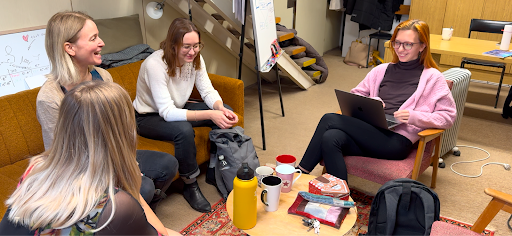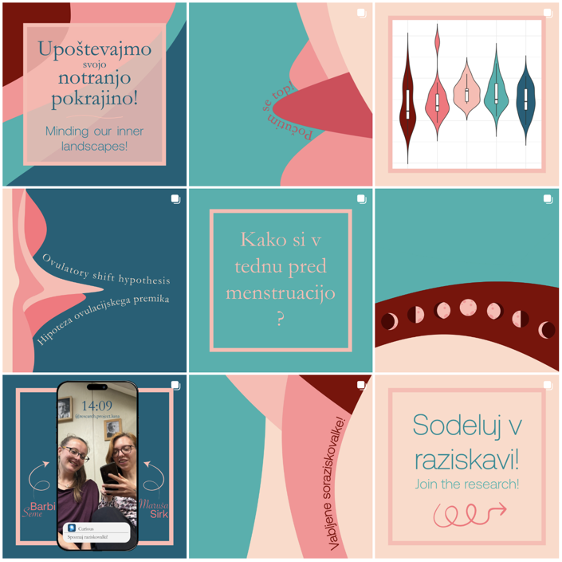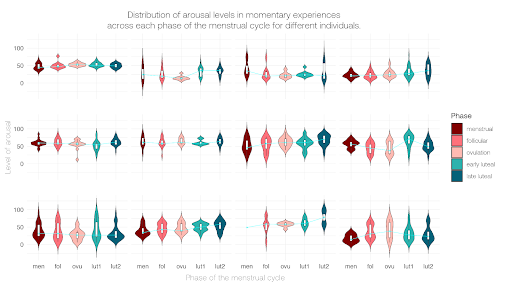Project Description:
Project Luna explores menstrual cycle experiences using Experience Sampling Methodology (ESM). Citizen scientists collect real-time data on momentary experiences, report daily reflections, and investigate their experiential landscape through personal research questions. This innovative approach aims to comprehensively understand the dynamic changes throughout the menstrual cycle, providing valuable insights into how these fluctuations can negatively and positively impact well-being and daily life.
By examining experiential dimensions such as openness, self-confidence, affect, and relationship dynamics, the project enhances self-knowledge among citizen scientists, empowering them to be more insightful about their lived experiences throughout the cycle. Additionally, we advocate for informed policies that recognize and accommodate the natural variations experienced by individuals. Project Luna seeks to bridge the gap between scientific knowledge and societal practices, fostering a community with an open and compassionate attitude towards diverse experiential landscapes.
Project Type: Kick Starting Grant
Theme: Justice and Equity, Health
Mentor:Aleksandra Berditchevskaia
LUNA – THE EXPERIENTIAL LANDSCAPE OF A MENSTRUAL CYCLE
Authors: Barbi Seme & Maruša Sirk
Project Relevance
Project Luna aims to bridge the gap in the scientific understanding of the phenomenology of the menstrual cycle. By capturing detailed, first-person experiences from citizen scientists throughout their cycles, the project seeks to illuminate how menstrual dynamics influence various aspects of life, including relationships, workplace challenges, decision-making, and daily functioning. This holistic approach emphasizes the broader implications of menstrual awareness in both personal and public spheres.
Project Activities and Current Status
The Luna project comprises several key activities, including a preliminary study and an ongoing pilot study titled The Experiential Landscape of a Menstrual Cycle. Additionally, the project focuses on providing practical recommendations for incorporating menstrual cycle awareness into everyday life and broader societal contexts. A final event is being planned to share research findings and foster an informed, data-driven public dialogue on the topic.

Group discussion with citizen scientists in project Luna
To date, approximately 100 citizen scientists have participated, collecting rich experiential data over a one-month period using the Curious (about) Consciousness ESM mobile app. Participants documented three momentary experiences and one daily reflection per day, alongside reports on PMS symptoms, brain fog, and peak states. To support their involvement, co-researchers attended training sessions, meet-ups, evaluation workshops, and online discussions within the project’s community channel. These events were conducted in a hybrid format, combining in-person sessions at the Center for Cognitive Science in Ljubljana with online options for participants from distant and rural areas.
Key Outcomes and Engagement
The data collected offers profound insights, such as visualizations illustrating the distribution of arousal levels across different phases of the menstrual cycle for various individuals. These findings highlight the nuanced and diverse experiences associated with menstrual dynamics.
The Luna project also maintains a website and active social media presence, sharing research results, educational content, and opportunities for collaboration. This online platform facilitates ongoing public discussion and raises awareness about menstrual health and its societal impact.
Mentorship and Collaboration
Through the IMPETUS mentorship program, the Luna team gained valuable insights into best practices for designing and executing a citizen science project. This guidance was particularly beneficial for participant recruitment and assessing the societal impact of the initiative. The project also established connections with other initiatives exploring similar topics, opening avenues for future collaborations.
Future Directions
The participatory approach of the Luna project has allowed it to grow organically, expanding beyond its initial scope to include additional research activities and new directions. Moving forward, the project aims to maintain and enhance citizen scientist engagement, fostering a deeper collective understanding of menstrual cycle phenomena.
Following the main data collection phase, the team plans to conduct in-depth statistical analyses and publish further scientific papers based on their findings. Securing funding for a larger-scale study is a key objective, which would enable more comprehensive research involving a broader group of citizen scientists. Ultimately, the project aspires to contribute to a more compassionate, creative, and curious society by deepening our collective understanding of the lived experiences surrounding the menstrual cycle.

Instagram feed of the project Luna




